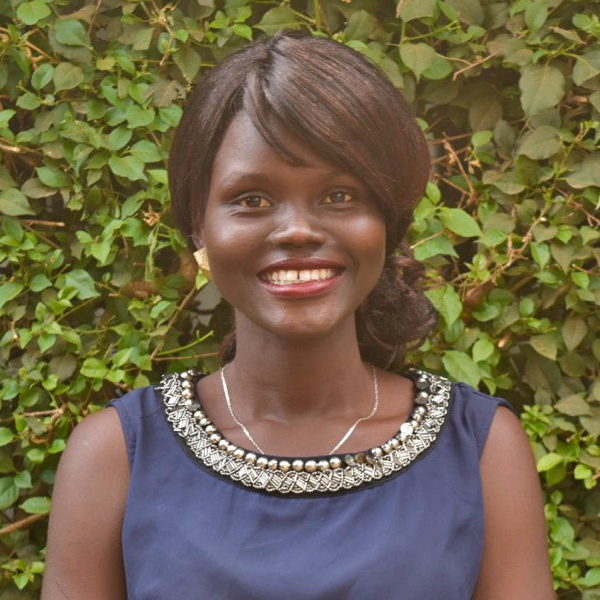
Widening the University Gate for Talented, Underserved African Youth
In 2014, when Aluel Deng was just 17 years old, her father arranged her marriage to a man that she had never met. Though early childhood marriage is illegal in South Sudan, societal norms tell a different story, and many young girls see getting married as an obligation to their family.
Born into a community where a young bride’s dowry can provide financial security in uncertain times, Aluel was encouraged by family and friends to accept her father’s request without question. But she could not sit back and accept that she would be married off, become a wife, and no longer be allowed to continue her education. Aluel refused the marriage and went to the Ministry of Justice to report her father for forcing an underage girl into marriage.
“Although my relatives see me as hard-headed, it doesn’t matter. It is something I am proud of. I want to have my own path,” Aluel says. She went on to graduate with one of the top examination results in all of South Sudan. Yet, like thousands of youth of a similar background, Aluel’s options for a university education were limited.
Young, bright students in Africa commonly encounter at least three barriers to higher education:
- Lack of enrolment spaces;
- Lack of resources to pay for education; and
- Relatively poor performance on typical college and university entry requirements, such as standardized test scores and a portfolio of extracurricular activities.
While as many as 20 to 30 percent of students in various African nations complete secondary school, only three percent of all students aged 18-22 in Africa have access to university education.
African Leadership Academy is dedicated to transforming Africa through education that prepares young people, like Aluel, to become ethical leaders. Of ALA’s first cohort of graduates in 2010, 25 percent had gained competitive admission to university, yet were unable to enroll and attend due to financial constraints; and by 2011, ALA graduates had gained admission to 171 universities yet only 58 of these institutions offered funding to support enrollment. Our initial experience suggested that a pooled scholarship fund, in which donors and universities would share costs, could dramatically improve enrollment outcomes for high performing African students from disadvantaged backgrounds.
There are only 200 public universities and 468 higher education institutions on the entire continent, where more than 600 million people are under the age of 25.
This led to a joint commitment in 2012 by ALA and the Mastercard Foundation in the form of a new scholarship financing approach. The Mastercard Foundation Scholars Program was explicitly designed to address the imbalance between supply and demand for scholarship money by leveraging a pooled scholarship fund and a carefully cultivated network of partnerships with universities and recruitment partners. The Scholars Program at ALA recruits high-potential youth with limited financial means from a portfolio of high schools and non-governmental organizations and matches them to universities across the world.
Aluel’s story shows what can happen when those barriers crumble and students can pursue their education past secondary school. As a young South Sudanese student, Aluel devoted herself to working with Adom-Wuor Student Associate to eradicate illiteracy and keep children in school. She has also demonstrated a deep desire to address flaws in South Sudan’s health care system working to ensure that children are no longer dying from malnutrition or cholera. Aluel’s committment shows her promise as a leader who will mobilize others to achieve change in Africa. It was this promise — not her grades or test scores — that made her a great candidate for the Scholars Program at the African Leadership Academy.
In 2017, Aluel caught the attention of Bridge2Rwanda, a gap year program based in Kigali, Rwanda that provides academic and leadership training to youth from Rwanda, DRC, South Sudan, and Burundi. Bridge2Rwanda has been a partner in the Mastercard Foundation Scholars Program at ALA since 2013, and it was through this partnership that the ALA recruitment team met Aluel.
The Scholars Program looks at factors outside of those traditionally used by admissions offices to predict success in university. Our experience suggests that the best assessment of whether a low-income, high-potential student will succeed in university does not come from test scores. Success is largely connected to a student’s effort in the learning process, ability to ask questions, interest in interacting with people from different backgrounds, and their capacity to overcome difficult situations. So the most valuable insight comes from teachers, community members, and organizations who have worked with the student and who know him or her best.
In 2018, Aluel will be starting her studies at Agnes Scott College in Decatur, Georgia. Aluel has big dreams for her return to South Sudan; she wants to break down tribalism and work in the public health field, saying “I believe that being a health worker is a perfect way of showing love for my country and citizens. I want to be going to areas of South Sudan where people don’t expect the services of people from my tribe. I would like to use my degree to turn our diversity in South Sudan into a tool for fighting hatred among the tribes.”
To close the gap that exists within higher education in Sub-Saharan Africa, universities worldwide must rethink the business of admissions and include more young people like Aluel with the same spark of promise.
About the Authors
Ikenna Acholonu is student relationship manager for Ashinaga.
Laura Kaub is program manager for Yale Young African Scholars.
Suzanne Hunter is director of scholar search and selection at African Leadership Academy.


